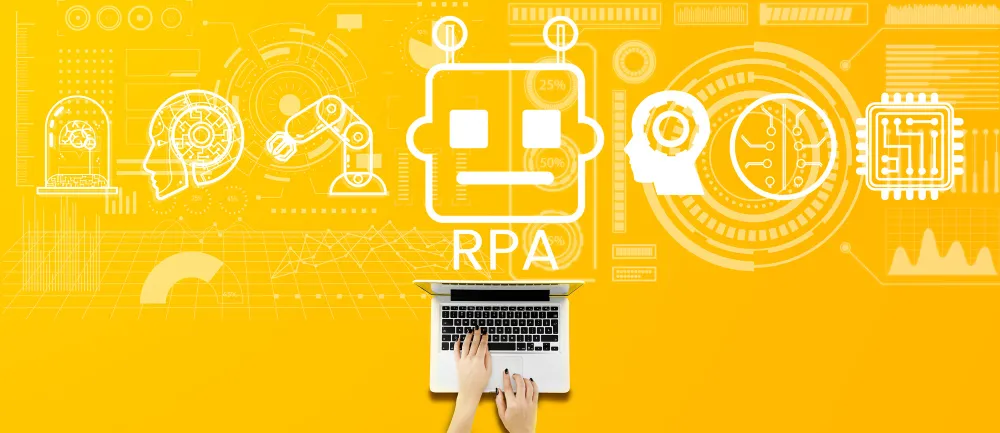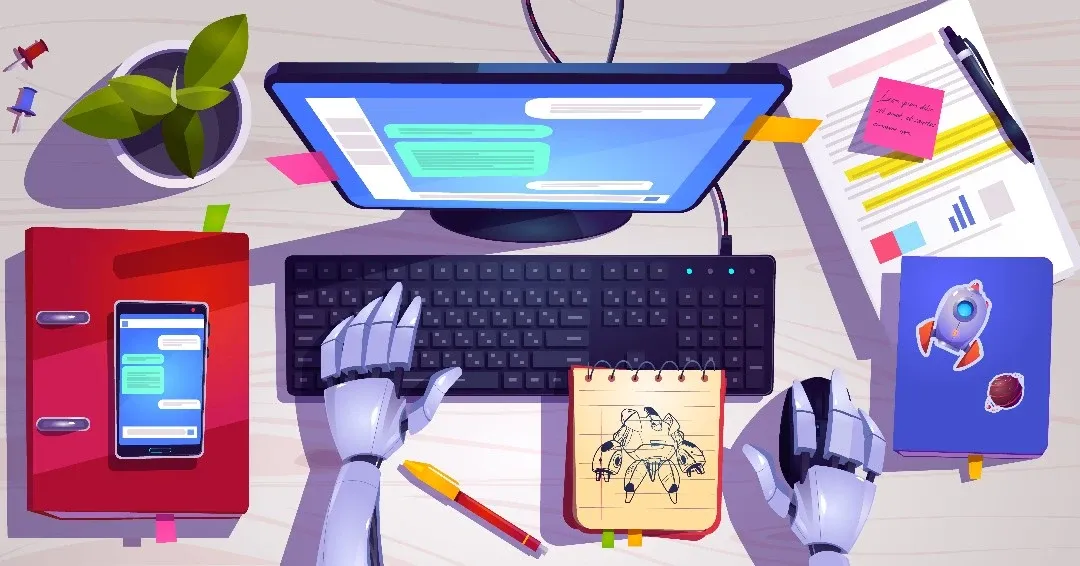How AI Transforms RPA into Intelligent Automation
Explore the future of work through the dynamic fusion of AI and RPA. Discover the power of intelligent automation, where AI and RPA seamlessly collaborate to boost productivity, efficiency, and ethical decision-making. Take your automation strategy to the next level with cognitive capabilities.
In today’s dynamic and fast-paced business landscape, organizations are on a perpetual quest to optimize operations, boost efficiency, and cut costs. Robotic Process Automation (RPA) is a potent tool tailor-made for automating repetitive, rule-bound tasks within business processes. Yet, while RPA excels in this domain, it faces limitations when it encounters complex and ambiguous data. This is precisely where Artificial Intelligence (AI) shines with it capabilities to augment RPA.
By merging the prowess of AI with RPA, organizations can unlock the true potential of intelligent automation. In this article, we’ll embark on an exploration of how AI metamorphoses RPA into the modern avatar of intelligent automation. We’ll delve into its benefits and review the profound impact it can have over the future of work.
Robotic Process Automation (RPA)
Robotic Process Automation has emerged as an excellent technological innovation, employing software robots, aptly named bots, to automate routine, rule-bound tasks nested within business processes. These RPA bots emulate human actions, interfacing with applications, manipulating data, and executing tasks ranging from data entry to report generation. RPA’s primary mission is to bolster efficiency, precision, and productivity by automating the humdrum, thus liberating human workers to engage in more strategic and impactful endeavors.
While RPA has solidified its reputation as a dependable technology for automating rule-based processes, it encounters its limitations. Designed chiefly for structured data and predefined rules, RPA stumbles when confronted with intricate, unstructured data. This drawback renders it less suitable for processes demanding cognitive prowess and decision-making rooted in vague information. Enter the synergy with AI.

The Dynamic Duo: AI with RPA
Artificial Intelligence, the venerable field of computer science, is dedicated to the creation of intelligent machines capable of tackling tasks traditionally reserved for human intelligence. AI encompasses subfields like machine learning, natural language processing, and computer vision.
When AI joins hands with RPA, the result is a transformation known as intelligent automation. This amalgamation unites the rule-based automation of RPA with AI’s cognitive capabilities, empowering bots to predict, learn from data patterns, and navigate complex decision-making scenarios.
Intelligent automation leverages AI technologies such as natural language processing (NLP), machine learning (ML), and optical character recognition (OCR) to broaden RPA bots’ automation horizons. Now, bots can decode and extract information from previously inscrutable data sources like emails, documents, and images, ushering in a new era of automation possibilities.

Advantages of Intelligent Automation
Intelligent automation emerges as the vanguard, offering several advantages over conventional RPA:
-
Handling Complex and Unstructured Data: The foremost benefit of intelligent automation lies in its proficiency in handling intricate and unstructured data. Traditional RPA bots rely on predefined rules and structures to process data, but when confronted with unstructured data such as full-text emails or scanned documents, they leave something to be desired. AI integration equips RPA bots with the prowess to decipher and extract information from unstructured data sources, even deciphering human language.
-
Enhanced Decision-Making: Intelligent automation empowers RPA bots to make informed decisions based on data patterns and algorithms. By harnessing machine learning, bots can discern patterns in data, extract pertinent information, and make decisions autonomously, without explicit programming. This shines in use cases like invoice processing, where AI-powered RPA bots learn to recognize patterns, expediting processes and improving accuracy.
-
Continuous Learning and Improvement: In contrast to the rigidity of traditional RPA, intelligent automation boasts the capacity for perpetual learning and enhancement. Machine learning algorithms enable bots to perpetually analyze data, detect patterns, and adapt, resulting in increased efficiency and accuracy. For instance, customer service chatbots powered by AI continuously improve their responses based on user interactions, thereby enhancing the customer experience.
-
Increased Process Automation Scope: Intelligent automation broadens the scope of automatable processes. While traditional RPA excels at rule-based tasks with structured data, AI-infused RPA extends its reach to complex processes that require nuanced understanding and decision-making.
-
Improved Efficiency and Productivity: Intelligent automation turbocharges efficiency and productivity by automating mundane, time-consuming tasks. As bots take over these routine chores, human workers can redirect their energies towards tasks demanding creativity, problem-solving, and human judgment.
-
Scalability and Flexibility: Intelligent automation brings scalability and flexibility to the table, allowing organizations to respond nimbly to shifting business landscapes. RPA bots can scale up or down in response to varying workloads, ensuring resource optimization.
-
Compliance and Auditability: In the realm of compliance and auditability, intelligent automation shines. RPA bots generate comprehensive logs and audit trails, enabling organizations to monitor and track automated processes. This transparency ensures adherence to regulatory requirements and facilitates internal audits.
The Future of Work: AI-Powered Automation
Intelligent automation is the harbinger of a profound transformation in the future of work. As organizations increasingly embrace AI-powered automation, the very fabric of work undergoes a sea change. Here are some illuminating trends and predictions for the future of work:
-
Human-Machine Collaboration: Intelligent automation isn’t about replacing humans; it’s about augmenting their capabilities. The future will witness harmonious collaboration between humans and RPA bots, with bots taking charge of routine tasks. This collaboration will enable human workers to focus on creativity, problem-solving, and judgment, rendering work more fulfilling.
-
Upskilling and Reskilling: The rise of automation mandates upskilling and reskilling initiatives to equip employees with the skills necessary to work alongside RPA bots and AI technologies. These initiatives will focus on cultivating expertise in areas like data analysis, process optimization, and collaboration with intelligent automation systems.
-
Job Redesign and Transformation: Intelligent automation will usher in job redesign and transformation. Some roles may evolve or become obsolete, while new ones will emerge. Organizations must reimagine job roles to harness the full potential of automation, potentially combining human and machine capabilities.
-
Ethical and Social Implications: As AI-powered automation proliferates, ethical and social considerations will gain prominence. Privacy, data security, algorithmic bias, and the societal impact of automation will necessitate ethical guidelines and regulations for responsible and inclusive implementation.
-
Agility and Adaptability: Intelligent automation’s agility and adaptability empower organizations to navigate dynamic business landscapes. Bots can swiftly adapt to new processes and changing data patterns, enabling organizations to stay competitive.
-
Hyperautomation: The integration of multiple automation technologies, known as hyperautomation, will gain traction. Combining RPA, AI, machine learning, process mining, and analytics will facilitate end-to-end automation of intricate business processes.
Conclusion
The fusion of AI with RPA unveils the genuine potential of automation, enabling organizations to automate a broader spectrum of processes and achieve superior outcomes. Intelligent automation empowers bots to make decisions, decipher complex data, boost efficiency and productivity, and offer scalability and flexibility. As AI-powered automation marches forward, the future of work will be characterized by human-machine collaboration, upskilling, job redesign, and ethical considerations. Organizations that embrace intelligent automation will gain a competitive edge, fuel innovation, and shape the destiny of work itself.